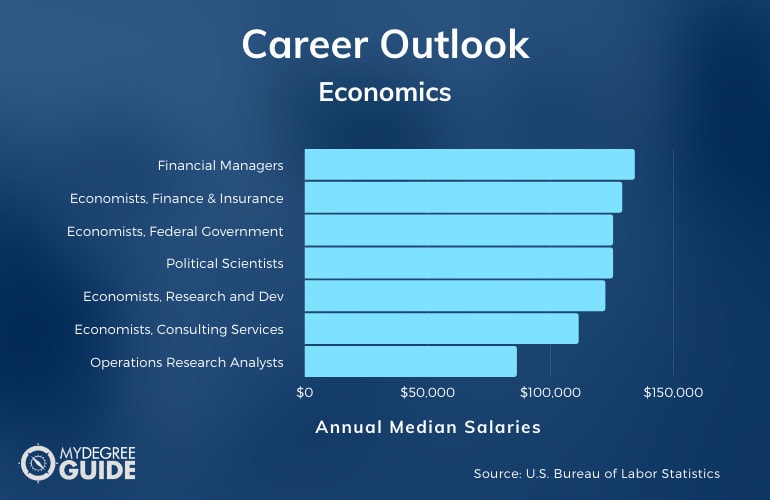You may want to consider an online masters in economics if you’re interested in supply, demand, and market performance. Econ students can also have a keen passion for understanding issues related to the economy.

Online masters programs in economics can help qualify you to work in different professional roles in various industries, such as finance, government, and media.
Editorial Listing ShortCode:
With economics positions having higher than average salaries and a positive job outlook, earning an econ masters can help advance your knowledge and qualifications in this rewarding and growing field.
Universities Offering Online Masters in Economics Degree Programs
Methodology: The following school list is in alphabetical order. To be included, a college or university must be regionally accredited and offer degree programs online or in a hybrid format.
American University
American University offers an online program for a Master of Arts in Economics. The program usually takes 20 months to complete and requires the completion of ten 8 week courses. A final capstone seminar is required to graduate. Applicants must have a bachelor’s degree and a credit in calculus.
American University is accredited by the Middle States Association of Colleges and Secondary Schools.
Boston College
Boston College offers an online program for a Master of Science in Applied Economics. The program requires students to complete 10 courses, with 5 courses open to electives. Classes can be taken on campus, online, or in a hybrid format. Applicants must have a GPA of 3.0 or higher and must submit 2 letters of recommendation and a personal statement.
Boston College is accredited by the New England Commission of Higher Education.
Colorado Christian University
Colorado Christian University offers an online Master’s in Economics program. The program can be completed online and requires 30 credit hours. Courses are 5 to 7 weeks long and are taken one at a time. Applicants must have a bachelor’s degree with a GPA of 2.5 or higher and should submit official transcripts.
Colorado Christian University is accredited by the Higher Learning Commission.
George Mason University
George Mason University offers an online Master of Arts in Economics. The program requires the completion of 10 courses and includes a capstone project. Those interested in the program must have a bachelor’s degree in any field with a GPA of 3.0 or higher, 2 letters of recommendation, and a personal statement.
George Mason University is accredited by the Southern Association of Colleges and Schools Commission on Colleges.
Georgia Southern University
Georgia Southern University offers an online program for a Master of Science in Applied Economics.
The program can typically be completed in 2 years, with students taking 2 courses per semester. To graduate, students must complete 10 courses. Applicants must have a bachelor’s degree with a GPA of 3.0 or higher and need to submit GRE scores.
Georgia Southern University is accredited by the Southern Association of Colleges and Schools Commission on Colleges.
Johns Hopkins University
John Hopkins University offers a Master of Science in Applied Economics. The program, which can potentially be completed in as little as 12 months, requires 10 courses. Classes can be taken online or on campus, part-time or full-time. Applicants must have a GPA of 3.0 or higher from an undergraduate degree program.
Johns Hopkins University is accredited by the Middle States Commission on Higher Education.
Purdue University
Purdue University offers a Master of Science in Economics online program. Students may choose to add a specialization in Business and Data Analytics, Financial Economics, Public Economics and Policy, or Advance Theory. Applicants must submit a statement of purpose, 2 letters of recommendation, and GMAT or GRE scores.
Purdue University is accredited by The Higher Learning Commission of the North Central Association of Colleges and Schools.
Southern New Hampshire University
Southern New Hampshire University offers an online Master’s in Economics degree program.
Students must obtain 36 credit hours. While the program can potentially be completed in 15 months, students may complete the program at their own pace. To be eligible, applicants must have a GPA of 2.75 or higher and admissions are open year-round.
Southern New Hampshire University is accredited by the New England Commission of Higher Education.
University of Missouri
The University of Missouri offers a Master of Arts in Economics. The program typically takes 2 years to complete when taking 1 or 2 classes per semester. To graduate, students must obtain 30 online credit hours. Applicants must have an undergraduate degree with a minimum GPA of 3.0.
The University of Missouri is accredited by the Higher Learning Commission.
University of North Dakota
The University of North Dakota offers a Master’s in Applied Economics. The program can be taken on campus or online and typically takes 2 years to complete. To graduate, students must complete 30 credit hours. Applicants must have an undergraduate degree with a GPA of 2.75 or higher and need to submit GRE or GMAT scores.
The University of North Dakota is accredited by the Higher Learning Commission of the North Central Association of Colleges and Schools.
Online Masters in Economics Programs

Economics masters programs can help equip you for various roles that blend economics with finance and research. In their careers, econ graduates may participate in the execution of research, conduct surveys and analyze the results, and examine market trends on a regular basis.
Earning your master’s degree in economics can help qualify you for a variety of economist positions in finance, insurance, research, education, media, management, consulting, and government.
Common careers in this field include:
- Financial manager
- Financial analyst
- Budget analyst
- Policy analyst
- News correspondent
- Statistician
As part of your online economics master’s degree program, you’ll be required to complete a variety of courses, including course topics like:
- Mathematics for economists
- Microeconomics
- Macroeconomics
- Econometrics
- Probability and statistics
- Real analysis
- Global economics
Other course topics can include game theory, environmental economics, data mining, labor economics, and energy economics.
Depending on your school and program, you may have the opportunity to select an area of concentration for your studies. Specialty areas include advanced theory, international economics, financial theory, economic policy, or applied economics.
In addition to coursework, some programs require you to complete a thesis or research project in order to graduate with your degree.
Economics Careers & Salaries

With an M.A. in Economics or MS in Economics online, you may have the opportunity to work in a number of different industries.
These industries can include finance, insurance, federal and state government, management, technical consulting, research and development, or educational services, among others.
According to the Bureau of Labor Statistics, roles related to the field of economics tend to have higher than average annual earnings and positive job outlooks.
| Careers | Annual Median Salaries |
| Financial Managers | $134,180 |
| Economists, Finance and Insurance | $129,060 |
| Economists, Federal Government | $125,350 |
| Political Scientists | $125,350 |
| Economists, Research and Development | $122,220 |
| Economists, Consulting Services | $111,340 |
| Operations Research Analysts | $86,200 |
| Financial Analysts | $83,660 |
| Budget Analysts | $78,970 |
| Economists, State Government | $73,510 |
A number of positions that may be available to you with a graduate degree in economics are predicted to experience job growth over the next several years.
The Bureau of Labor Statistics projects growth for budget analysts (3% job growth), financial analysts (5%), policy analysts (6%), economists (14%), financial managers (15%), and operations research analysts (25%).
Economics Master’s Curriculum

The specific makeup of online masters programs economics coursework will vary from one school to the next, but common courses include the following:
- Microeconomics: You’ll learn fundamental principles and theories of microeconomics, including consumer theory, markets, and competition.
- Macroeconomics: This course is a review of relevant theories and concepts in macroeconomics, including growth economics, business cycles, and money and finance.
- Mathematics for Economists: You’ll develop skills related to the use of tools in economic analysis, including advanced calculus and algebra.
- Probability and Statistics: This course covers key theories and methods of probability and statistics commonly utilized in the field of economics.
- International Economics: This course is an exploration of current economic issues through an international or global lens.
- Game Theory: You’ll develop an understanding of game theory as it relates to economics and social sciences more generally.
- Non-Market Valuation: You’ll study relevant techniques used in the cost-benefit analysis process for local goods.
- Forecasting Financial Markets: This course explores key concepts and methods used to accurately analyze financial data in order to understand and forecast financial markets.
- Introduction to Econometrics: This course covers how various mathematical methodologies are utilized in economics, and you’ll gain a better understanding of various economic systems.
- Growth Economics: You’ll explore various elements of economic growth, including inflation, market value, and gross domestic product.
Your course curriculum will also fluctuate depending on the area of concentration you choose to pursue as part of your degree. In some graduate economics programs, coursework may be complemented by internship opportunities, thesis requirements, or final research project requirements.
How to Choose an Online Economics Program

When looking for the right online economics masters program for you, there are a number of factors that may impact your final decision, such as:
- Program costs, including tuition and other fees
- Admission requirements
- The school’s accreditation status
- Course curriculum options
- Available specializations or concentrations
- Attendance and enrollment options
Choosing an online economics degree program that’s right for you will depend on your personal and professional goals and how a particular program matches those interests. For instance, some programs offer full-time or part-time enrollment as well as online, on-campus, or hybrid learning options.
Admissions Requirements

While admission criteria for online masters degrees in economics can vary from one school to the next, common requirements include:
- Bachelor’s degree. Some schools may require a bachelor’s degree in a specific area of studies.
- Statement of intent. This statement describes your interest in the program, your educational background, and your professional experience.
- Letter of recommendation. Some schools request professional or academic reference letters from current or former colleagues in work or educational settings.
- GRE or GMAT scores (only some schools require them). A growing number of schools no longer require GRE or GMAT scores for admissions, but there are still some schools who request them.
In addition to the requirements above, you may also need to submit an online application, pay an application fee, and submit a copy of your resume or CV.
Accreditation

Regional accreditation is a status awarded to academic institutions that meet a specific set of standards in terms of the quality of their educational offerings.
Attending an accredited institution may impact your ability to enroll in PhD programs down the road or to transfer credits into a program at another school. In some cases, employers may place higher regard on education received at an educational institution that has been regionally accredited.
The US Department of Education’s website offers more information on the accreditation status of prospective schools.
Financial Aid and Scholarships

Pursuing your online master’s in economics comes with a price tag, but there are a number of options available to qualifying students to help cover the costs, including:
- Federal and state financial aid. Government aid is available to qualifying students in the form of grants and loans.
- Scholarships. Need-based or merit-based scholarships can be offered by different private and public organizations.
- Employer training programs. If you’re currently working, you can see if your work offers training programs or professional development programs.
- Work-study programs. These are often offered through various government-run institutions.
In some cases, there may be special financial aid options available for members of the military as well. For more information on financial aid opportunities, you can visit the US Department of Education’s website.
In addition to these options, there are universities and organizations that offer graduate scholarships for women that may be a good idea to pursue.
Economics Professional Organizations

Joining an economics professional organization may offer you a number of personal and professional benefits. You may have the opportunity to network with other economics professionals and gain access to professional development training.
- American Economic Association (AEA)
- National Association for Business Economics (NABE)
- World Economics Association (WEA)
Becoming part of an economics professional organization may also assist you in searching for new employment opportunities and staying up to date on the latest industry trends.
Can I Get a Masters in Economics Online?

Yes, it is possible to earn a masters in economics online. A number of factors can impact the specific online economics program that you choose to apply to.
These factors include whether you can attend on a part-time or full-time basis, any internship or thesis requirements, and whether you can transfer previously earned credits into the program.
Additional considerations include the accreditation status of the program, admission requirements, and the home state of the school, as this may impact total tuition costs.
Which Is Better, MA in Economics or MBA?
Whether a Master of Arts in Economics or a Master of Business Administration (MBA) is the better path for you will largely depend on your professional experience and future career goals.
| MA in Economics | Master of Business Administration |
|
|
The best option for you is likely the one that lines up with the goals you have for your career trajectory.
What Can You Do with a Masters in Economics?
With a masters degree in economics, you may be prepared to take on a variety of positions in the field. Econ graduates often pursue work as economists. Economists can work in industries such as finance, media, education, government, research and development, or insurance.
Additional roles related to the field include financial analyst, budget analyst, financial manager, news correspondent, operations research analyst, policy analyst, and chief financial officer.
How Long Does It Take to Get a Master’s in Economics Online?

When enrolled on a full-time basis, earning a masters in economics may take an average of 2 years.
In some cases, a 36 credit hour masters program may take as little as 1 year to complete with full-time, year-round enrollment. Thesis or internship requirements can add some time to completion.
Several factors can influence how long it may take you to earn your degree, such as if you enroll on a full- or part-time basis and if you stay continuously enrolled, including through the summer.
What’s the Difference Between a Graduate Certificate vs. Masters in Economics?
While graduate certificate and master’s in economics programs both offer graduate-level education, each program option can lead to different outcomes.
| Graduate Certificate | Masters in Economics |
|
|
Whether a master’s degree or graduate certificate in economics online is right for you will often depend on your career aspirations, financial abilities, and available time commitments.
What’s the Difference Between a Master of Arts vs. Master of Science in Economics?
When deciding on a master’s in economics program, you may have the choice between an Master of Arts in Economics and a Master of Science in Economics.
| Master of Science in Economics | Master of Arts in Economics |
|
|
Reviewing the specific course offerings for each distinct program type may help you in narrowing down whether an MS or MA in Economics is right for you.
Is a Masters in Economics Worth It?

Yes, a masters in economics is worth it for many students. Earning a master’s in economics online can help prepare you for a number of opportunities in this rewarding field.
Common careers related to economics include economist, financial manager, budget analyst, policy analyst, and operations research analyst. With a masters degree, you can also enhance your qualifications for various management and leadership-level positions, including those in the c-suite.
A number of careers in the field of economics are predicted to experience positive job growth over the next ten years. For example, the Bureau of Labor Statistics projects 14% job growth for economists, which is much faster than the average growth for all occupations.
Getting Your Masters in Economics Online

Completing your masters in economics online may open the door to a number of rewarding career options. You may choose to focus on areas related to economic development, analysis, or research.
Economics positions appear in a range of industries, including finance, insurance, research, government, and media. If you’re ready to advance your training with a masters in economics, you can start researching online programs from accredited schools to find the one that best fits your interests and aspirations.
